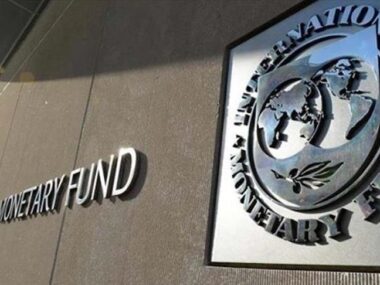Nathan Frederiksen is fairly successful. He’s nearing 40 and is on course to retire by 60. Although he makes some sacrifices like driving an unattractive car and handling home repairs himself, he manages to save 10% of his income for retirement and keep an emergency fund while supporting his wife and four kids in Boise, Idaho.
Despite his personal financial stability, Frederiksen isn’t optimistic about the broader economy. He’s noticed increased inflation affecting his expenses but feels reassured knowing his family is financially secure if unexpected expenses arise.
This sentiment isn’t unique to Frederiksen. A recent poll by the Wall Street Journal revealed that while many Americans perceive the national economy negatively, they feel positive about their personal finances. The majority feel it’s becoming harder for average individuals to prosper, yet nearly half believe their own financial situation is improving.
This discrepancy isn’t new. Gallup polling from last April showed a similar trend, with few rating the economy favorably but many rating their personal finances positively.
Despite these perceptions, economic indicators show improvement. Since President Joe Biden took office, unemployment rates have dropped, inflation has moderated, and GDP growth has surpassed that of other developed nations. Financial markets have also performed well, with record highs in the S&P 500.
However, there’s a growing disparity between economic data and public sentiment, which experts attribute to the sources of information people rely on. Ben Harris, from the Brookings Institution, suggests that while individuals can assess their personal finances, they often turn to social media and biased news sources for information about the broader economy, leading to misinformation and misconceptions.
The truth can be harsh.
Jonathan Barricklow and his family are financially secure. As a director at an automotive company in Bowling Green, Ohio, Barricklow even profited from stock market investments during the pandemic. Despite being aware of high inflation rates, Barricklow was surprised to find minimal price increases when running a concession stand at a gymnastics meet. Upon closer examination of his grocery bills, he realized that his costs had remained relatively stable between 2022 and 2023, contrary to his expectations.
This realization prompted Barricklow to recognize that extreme stories about inflation dominate public attention, overshadowing more moderate realities. He emphasizes the importance of considering consumer behavior alongside sentiment when gauging Americans’ economic outlook.
Contrary to negative sentiment, consumer behavior indicates confidence in the economy. Americans are spending at high rates, leaving jobs in pursuit of better opportunities, and investing in the stock market, reflecting a positive overall sentiment towards the economy.
A sensitivity to pain.
Americans are still grappling with the aftermath of a pandemic that abruptly halted much of the US economy. Many individuals nearing retirement age shared with CNN that the lingering memory of the 2008 financial crisis, along with its impact on their savings, continues to influence their perception of the economy.
Additionally, concerns about geopolitical tensions in the Middle East and Europe, uncertainty surrounding the housing market, and apprehension related to election-year dynamics trouble even the most financially prepared individuals, fostering a disquieting sense of unpredictability.
The fear of a potential stock market crash particularly preoccupies Dave Koloskee, a 60-year-old building and home inspector from Erie, Pennsylvania. He worries about the prospect of a significant reduction in his retirement savings overnight, which could have severe consequences. Despite his anticipation of retiring at 65, financial unease persists, exacerbated by concerns about stagnant income and inflation.
But why do these future worries feel so palpable in the present moment?
According to Megan McCoy, a professor of financial therapy at Kansas State University, individuals experiencing chronic pain often find their pain tolerance decreasing over time. Similarly, ongoing financial concerns can heighten sensitivity to economic fluctuations.
Living amidst prolonged uncertainty over the past several years has left many feeling on edge, waiting for potential economic setbacks. This anticipatory anxiety can exacerbate reactions to any economic news, amplifying day-to-day stressors or minor anxieties.
McCoy’s recent survey of financial planning clients, who typically skew older with higher net worth, revealed that 72% of respondents were grappling with financial anxiety, even with professional guidance.
Went bowling.
Julie Levitch, a single mother approaching her 55th birthday, is employed at a tech firm in Scottsdale, Arizona. The 2008 recession and subsequent medical expenses severely impacted her financial stability, causing her considerable distress. She recalls having unsettling dreams about being retired and homeless during that difficult period.
Approximately a decade ago, Levitch made a concerted effort to improve her financial situation. She sought advice from financial experts like Suze Orman, subscribed to publications such as Kiplinger’s Personal Finance, and made significant lifestyle adjustments to allocate 20% of her income to her 401(k) account. She also managed to secure a home loan at a remarkably low interest rate of 2.5%, which has since appreciated significantly in value. Consequently, her mortgage payments are now lower than the rental costs for a comparable one-bedroom apartment in the same area.
Despite these achievements, Levitch remains apprehensive. She observes colleagues in her industry discussing layoffs and job searches on LinkedIn, and she harbors concerns about the impact of the artificial intelligence surge on her profession. Additionally, she is acutely aware of people in her social circle who are facing financial difficulties.
Levitch participates in a local bowling league in Arizona, where she interacts with around 100 individuals every Tuesday evening. Many of these participants, she believes, are living on the financial brink, struggling to make ends meet.
However, Levitch refrains from discussing her own financial success with her bowling league peers, fearing it may make them uncomfortable. Despite her own prosperity, she empathizes with those who are facing financial challenges, acknowledging the pervasive discontent among individuals who feel excluded from the narrative of economic prosperity.
Ben Harris, an economist, notes that some Americans, like Levitch, have experienced unexpected financial gains due to surges in housing and stock prices. He emphasizes that unlike previous wealth booms primarily benefiting the top 20% of households, the current trend has resulted in real, inflation-adjusted wealth increases across various income brackets, including those at the lower end. While individuals in the middle class or higher income brackets may experience feelings of guilt, Harris points out that overall inequality is on the decline.











